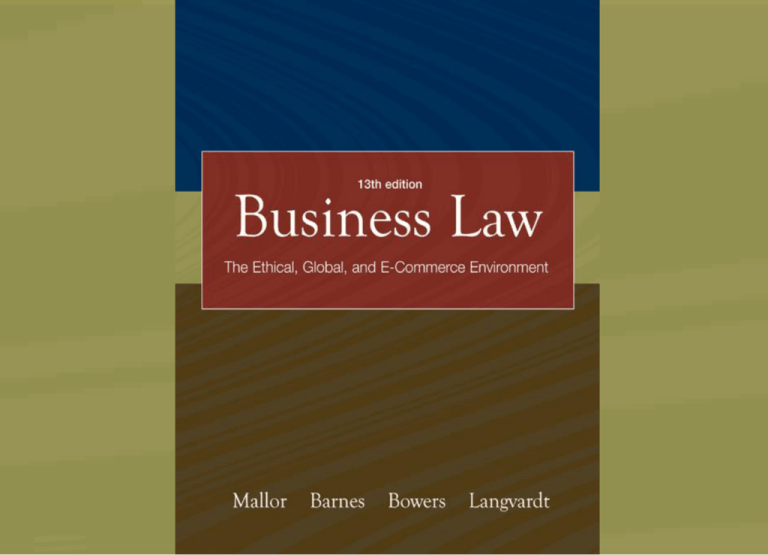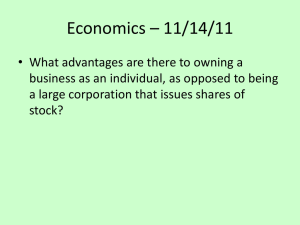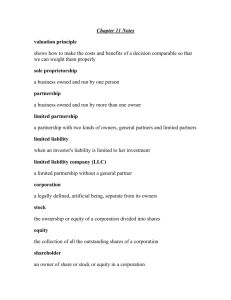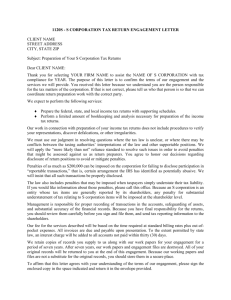
P A R T
10
Corporations
History & Nature of Corporations
Organizational and Financial
Structure of Corporations
Management of Corporations
McGraw-Hill/Irwin Business Law, 13/e
© 2007 The McGraw-Hill Companies, Inc. All rights reserved.
P A R T
10
Corporations
Shareholders’ Rights & Liabilities
Securities Regulation
Legal & Professional Responsibilities
of Auditors, Consultants, and
Securities Professionals
McGraw-Hill/Irwin Business Law, 13/e
© 2007 The McGraw-Hill Companies, Inc. All rights reserved.
C H A P T E R
42
Organization and Financial
Structure of Corporations
“Our business is
company
creation.”
Ann Winblad, venture
capitalist, quoted in
Fortune (Sellen and
Daniels, Oct. 1999)
Learning Objectives
Promoters
and preincorporation
transactions
Incorporation and defective attempts
Financing for-profit and nonprofit
corporations
The nature and operation of shares
42 - 5
Overview
Each state has enacted laws detailing how a
corporation may be created
A promoter of a corporation incorporates the
business, organizes the initial management
team, and raises initial capital
A promoter may be the one who originated
the idea for the firm or may be a professional
hired to undertake incorporation activities
42 - 6
Preincorporation Contracts
A promoter will be liable for contracts made
during the preincorporation period unless the
corporation adopts the contracts made by the
promoter (adoption) and the third party
agrees to substitute the corporation for the
promoter (novation)
42 - 7
Like agency ratification, may be express or
implied
Contracts adopted typically: employment
and real property lease or purchase
Crye-Leike Realtors v. WDM, Inc.
Facts:
Richert, a promoter, signed a contract with
plaintiff by which plaintiff would act as real
estate broker for Richert’s firm, which had
not yet been incorporated
42 - 8
Richert signed in his individual capacity
Richert formed the corporation, WDM, Inc.
Plaintiff showed defendant a property and
defendant made an offer, but the deal fell
through
Crye-Leike Realtors v. WDM, Inc.
Facts:
42 - 9
Two months later, WDM entered a lease for
the same property using another broker
Following day, WDM terminated the
brokerage contract with plaintiff
Plaintiff sued WDM for breach of contract
Trial court entered summary judgment for
defendant because WDM had not ratified or
adopted Richert’s contract with plaintiff
Crye-Leike Realtors v. WDM, Inc.
Legal Analysis & Holding:
Appellate court: “After it was incorporated,
WDM began to receive the benefits of
Richert’s contract with [plaintiff].. evidence
supports [plaintiff’s] claim that WDM ratified
or adopted the contract after its incorporation
…We conclude that this is sufficient evidence
of WDM’s ratification of the contract…”
42 - 10
Reversed and remanded
Share Subscriptions
Preincorporation share subscriptions are
contracts in which a prospective shareholder
offers to buy a specific number of shares in a
new corporation at a stated price
Under the Model Business Corporation Act
(MBCA), a prospective shareholder may not
revoke a preincorporation subscription for a
six-month period
42 - 11
Promoter Duties
A promoter is not an agent of the proposed
corporation or investors since they did not
appoint the promoter, but a promoter owes a
fiduciary duty to the corporation and to its
prospective investors
No self-dealing, duty of loyalty, etc.
A corporation may compensate a promoter
with shares
42 - 12
Incorporation
A U.S. business may incorporate in any state
Fees, taxes, and laws vary from state to state
See, e.g., Texas corporations section:
www.sos.state.tx.us/corp/index.shtml
A Texas Corporation
Stock Certificate
42 - 13
Steps in Incorporation
1.
2.
3.
4.
5.
Prepare articles of incorporation
Sign and authenticate articles by one or more
incorporators
File articles with secretary of state and pay fees
Receive copy of articles of incorporation stamped
“Filed” by secretary of state, along with fee receipt
Hold organizational meeting for purpose of
adopting bylaws, electing officers, and transacting
other business
42 - 14
Incorporation Details
The articles of incorporation (or charter) is
the basic document stating the rights and
responsibilities of a corporation, its
management, and its shareholders
42 - 15
Must add extension to name indicating
corporate form: Inc., Corp., Co., Ltd.
Must include other specifics, such as number of
shares authorized, initial registered office and
agent’s name, name and address of each
incorporator
Incorporation Details
Other provisions (not inconsistent with law)
may be added to articles of incorporation or
may be included within corporate bylaws
See Fig. 2, page 990
To retain corporate status, a corporation
must file an annual report with the secretary
of state of the state of incorporation and pay
an annual franchise fee or tax
42 - 16
Defective Incorporation
Sometimes, an attempt to incorporate fails
One consequence is that the corporate shield
does not exist to protect shareholders,
officers, and directors from personal liability
Another possibility is that a party to a
contract involving the defective corporation
may claim nonexistence of the corporation
to avoid a contract made in the name of the
corporation
42 - 17
De Jure Corporation
De jure corporation: exists when promoters
and incorporators substantially comply with
each mandatory (shall, must) requirement to
incorporate the business
The validity of a de jure (by law) corporation
cannot be attacked except by the state of
incorporation due to noncompliance with
state corporation laws
42 - 18
De Facto Corporation
De facto corporation: exists when promoters
fail to comply with all of the mandatory
requirements, yet comply with most of the
mandatory provisions
The validity of a de facto corporation could
be attacked by a third party, or itself, or the
state of incorporation, but may be treated by
as a corporation under the judicial doctrine
of corporation by estoppel
42 - 19
The MBCA
Under the MBCA, filing the articles of
incorporation is conclusive proof that the
corporation exists
MBCA imposes joint and several liability for
a purported corporation’s contracts and
torts on managers and shareholders who
both (1) participate in operational decisions
of the business and (2) know the corporation
does not exist
42 - 20
Christmas Lumber Co., Inc. v.
Valiga
Facts:
Contractor (Waddell) and Valiga entered home
construction contract, which fell through
Contractor had purchased construction materials
from plaintiff (through Graves) and in 1990,
plaintiff filed suit against Valiga and contractor
1992: Valiga filed separate suit against Waddell
and Graves, claiming defective incorporation
Suits consolidated; trial court found Waddell and
Graves liable as partners to Valiga
42 - 21
Christmas Lumber Co., Inc. v.
Valiga
Legal Reasoning & Holding:
Waddell argued he did not know incorporation
had not occurred
Evidence: Waddell testified he and Graves were
“partners,” the two entered a joint venture
agreement, and they shared the contractor’s fee
Conclusion: Waddell and Graves were partners
Judgment for Valiga affirmed
42 - 22
Non-Profit Incorporation
A non-profit corporation incorporates in the
same way as a profit corporation, but must
declare whether it is a:
public benefit corporation, mutual benefit
corporation, or religious corporation
Nonprofit corporation’s articles must also
state whether it will have members
42 - 23
Financing Corporations
For-profit corporations are financed by:
42 - 24
Sale of securities, including shares, debentures,
bonds, and long-term notes payable
Bank loans
Short-term financing (e.g., inventory financing)
Equity Securities
Equity securities, better known as stock or
shares, create an ownership relationship, thus
stockholders or shareholders own a corporation
State laws permit corporations to issue
classes of shares with specific rights:
Common
Preferred
42 - 25
Common Shareholders
Claims for dividend payments or asset
distribution on liquidation are subordinate
to creditor or preferred shareholder claims
However, common shareholders have the
exclusive right to elect corporate directors
and exclusive claim to corporate earnings
and assets that exceed the claims of creditors
and other shareholders
42 - 26
Preferred Shareholders
Preferred shareholders generally receive
liquidation and dividend preferences over
common shareholders
A corporation may have several classes of
preferred shares with specific rights related
to dividend payments, asset distribution
upon liquidation, voting, stock redemption,
and stock conversion
42 - 27
Share Types
Authorized shares are shares a corporation is
permitted to issue by its articles of
incorporation
A corporation may not issue more shares than
authorized
Issued shares have been sold to shareholders
Outstanding shares are currently held by
shareholders
42 - 28
Options, Warrants, & Rights
A board of directors may issue options for
purchasing the corporation’s shares
Issued to top-level managers as an incentive
Warrants are options evidenced by
certificates
Rights are short-term certificated options that
are usually transferable
42 - 29
Used to give present security holders an option
to subscribe to more shares
Debt Securities
Corporations may borrow
money to operate by issuing
debt securities, such as bonds,
debentures, and notes payable
Debt securities create a
debtor–creditor relationship
between the corporation and
the security holder
42 - 30
Debt Securities
Debentures are long-term, unsecured debt
securities with a 10 to 30 years term
Bonds are long-term, secured debt securities
Having an indenture, or a contract stating the
rights of the debenture holder
Identical to debentures except that bonds are
secured by collateral
Notes generally have less than a five year
term and may secured or unsecured
42 - 31
Consideration for Shares
MBCA permits shares to be issued in return
for any tangible or intangible property or benefit
to the corporation, including cash, promissory
notes, contracts for services to be performed
for the corporation, services performed for
the corporation, and securities of the
corporation or another corporation
42 - 32
Consideration for Shares
The board must issue shares for an adequate
dollar amount of consideration
Par value is an arbitrary dollar amount that
may be assigned to shares by the articles of
incorporation
42 - 33
Does not reflect the fair market value, but is the
minimum amount of consideration for which the
shares may be issued
Share Subscriptions
Under the terms of a share subscription, a
prospective shareholder promises to buy a
specific number of shares at a stated price
Generally in writing, though not required
A share certificate may not be issued to a
share subscriber until the share price has
been fully paid
42 - 34
Transfer of Shares
Share certificates are registered with the
corporation in name of a specific person
Indorsement of a share certificate on back by
the registered owner and delivery of the
certificate to another person transfers
ownership of the shares
Under the UCC, a corporation owes a duty
to register the transfer of any registered
shares, provided it has proper indorsement
42 - 35
Transferability & Restrictions
Shares in a publicly held corporation are
freely transferable, but often close
corporations (less than 50 shareholders)
restrict transfer to ensure control
Four categories of transfer restrictions: (1)
rights of first refusal and option agreements,
(2) buy-and-sell agreements, (3) consent
restraints, and (4) provisions disqualifying
purchasers
42 - 36
Test Your Knowledge
True=A, False = B
A promoter is always liable for contracts
made during the preincorporation period.
A U.S. business may incorporate in any state.
A de facto corporation exists when promoters
and incorporators in fact comply with each
mandatory requirement to incorporate the
business
Warrants are stock options evidenced by
certificates.
42 - 37
Test Your Knowledge
True=A, False = B
Preferred shareholders have the exclusive
right to elect corporate directors and the
exclusive right to dividend payments.
For-profit corporations are financed only
by issuing securities in the form of shares.
The MBCA permits shares to be issued in
return for any tangible or intangible property
or benefit to the corporation.
42 - 38
Test Your Knowledge
Multiple Choice
Which of the following is not a debt security:
(a)
(b)
(c)
(d)
(e)
42 - 39
Stock
Bond
Debenture
Note
none of the above
Test Your Knowledge
Multiple Choice
The Steel Inc. Board of Directors plan to
issue dividends this year. Which of the
following is false?
(a) Preferred shareholders receive their
dividends before common shareholders
(b) Creditors receive their dividends before
common shareholders
(c) Common shareholders receive their
dividends before either creditors or preferred
shareholders
42 - 40
Thought Question
Do you believe that a
company’s stock price
reflects a company’s
value or success in (a)
the marketplace, and (b)
society?
42 - 41




